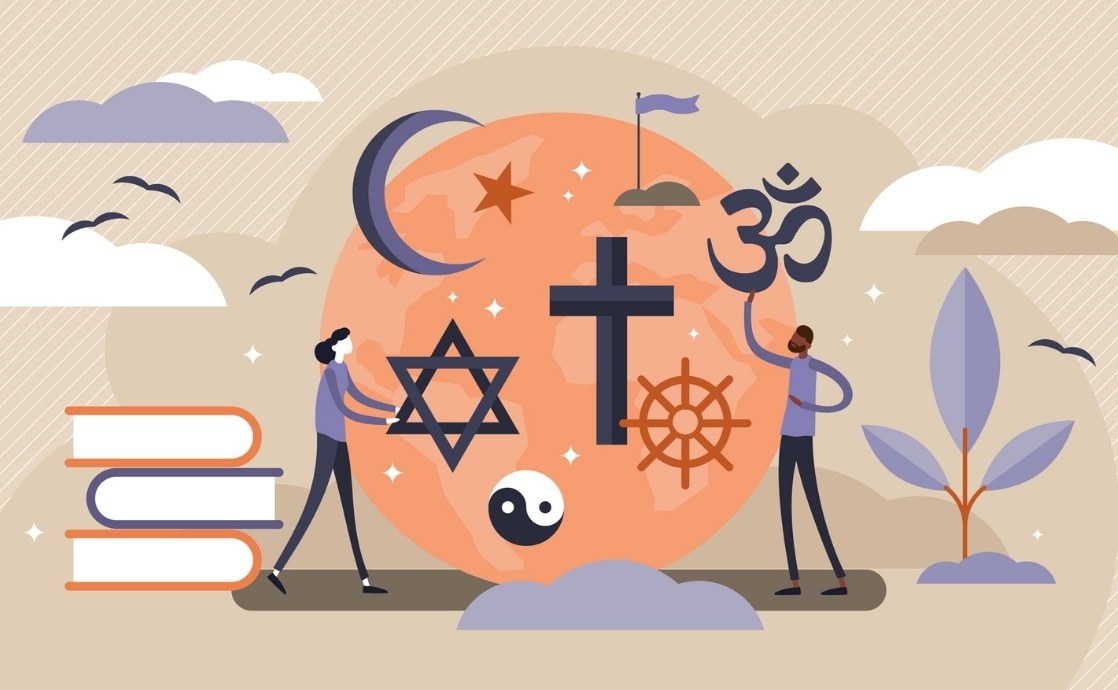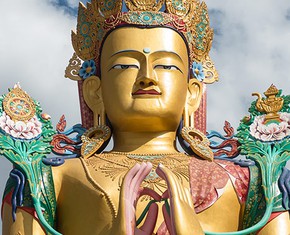The views expressed in our content reflect individual perspectives and do not represent the authoritative views of the Baha'i Faith.
In the early 1900s, a Baha’i asked Abdu’l-Baha, one of the Baha’i Faith’s central figures, why good people need religion. “Those who are blessed with good actions and universal benevolence, who have praiseworthy characteristics, who act with love and kindness toward all creatures, who care for the poor, and who strive to establish universal peace—what need have they of the divine teachings?” she asked.
According to the most recent Pew Research Center U.S. Religious Landscape Study, 53% of adults say religion is “very important” in their lives, and another 24% say it’s “somewhat important.” At the same time, according to the study, 22.8% of Americans are unaffiliated with any religion, so this question of why we have religion is probably on many people’s minds.
Why Do We Have Religion?
Our daily thoughts and aspirations are often self-centered until our perspectives widen, and we’re inspired to work towards nobler and loftier goals that will benefit humanity. Indeed, Abdu’l-Baha replied to this question:
Know that such actions, such efforts and such words are praiseworthy and approved, and are the glory of humanity. But these actions alone are not sufficient; they are a body of the greatest loveliness, but without spirit. No, that which is the cause of everlasting life, eternal honor, universal enlightenment, real salvation and prosperity is, first of all, the knowledge of God.
It is known that the knowledge of God is beyond all knowledge, and it is the greatest glory of the human world. For in the existing knowledge of the reality of things there is material advantage, and through it outward civilization progresses; but the knowledge of God is the cause of spiritual progress and attraction, and through it the perception of truth, the exaltation of humanity, divine civilization, rightness of morals and illumination are obtained.
He further explained that if this knowledge of God combines with “the love of God, and attraction, ecstasy and goodwill, a righteous action is then perfect and complete.” It is the love of God that ultimately leads to the love of humanity, and it is sincere intentions that purify our actions and behaviors.
To help us understand how an action could appear righteous but have selfish motives, Abdu’l-Baha gave an example of a butcher protecting his sheep. Although the act of protecting the sheep appears to be kind, the butcher’s intentions are merely to slaughter the sheep and earn profit from it. So, no goodwill is there.
With religion comes new institutional systems and universal moral ethics, laws, and principles that develop society and bring different communities together. Baha’is believe that God sends a prophet, or Manifestation of God — such as Buddha, Krishna, Moses, Zoroaster, Christ, and Mohammed — in every stage of humanity’s development to bring about our collective spiritual and social transformation. And Baha’is believe that the latest divine Messengers to guide and enlighten humanity are the Bab, the forerunner of Baha’u’llah, and Baha’u’llah — the prophet and founder of the Baha’i Faith.
RELATED: The Baha’i Concept of Progressive Revelation
Some of the Baha’i principles, for example, are the independent investigation of truth, the harmony of science and religion, the equality of men and women, the abolition of all forms of prejudice, and the oneness of humanity — which is “the pivot round which all the teachings of Bahá’u’lláh revolve.”
So, religion reminds humanity of its inherent oneness and interdependence. Our approach to each other changes when we all know that we are all created equal, that every soul was created in the image of God, and our purpose in life is to uplift and help each other. And the spiritual progress that we make in this world will ultimately lead to greater happiness and attainments after we die.
What Does Being Religious Mean?
Even though one of the purposes of religion is to bring about love and unity, so many conflicts, divisions, and wars have been made in the name of religion. That’s why Abdu’l-Baha said, “If religion becomes a cause of dislike, hatred and division, it were better to be without it, and to withdraw from such a religion would be a truly religious act. For it is clear that the purpose of a remedy is to cure; but if the remedy should only aggravate the complaint it had better be left alone. Any religion which is not a cause of love and unity is no religion.”
Of course, it is not enough to say we belong to a religion if these beliefs in divine teachings are not accompanied by deliberate and persistent effort to put all of the divine principles into practice and “translate that which is written into reality and action.” Being a Baha’i, for instance, isn’t just an acknowledgement that Baha’u’llah is the latest divine messenger for this stage of humanity. It is also a commitment to live a service-oriented life. The Baha’i writings say:
Turn towards God, and seek always to do that which is right and noble. Enrich the poor, raise the fallen, comfort the sorrowful, bring healing to the sick, reassure the fearful, rescue the oppressed, bring hope to the hopeless, shelter the destitute!
This is the work of a true Baha’i, and this is what is expected of him. If we strive to do all this, then are we true Baha’is, but if we neglect it, we are not followers of the Light, and we have no right to the name.
What Are the Benefits of Religion?
This ability of religion to effect transformations at the individual and societal levels has been witnessed for ages. Baha’u’llah wrote, “And yet, is not the object of every Revelation to effect a transformation in the whole character of mankind, a transformation that shall manifest itself both outwardly and inwardly, that shall affect both its inner life and external conditions?”
For example, faculty at the Harvard Business School noticed that, at the societal level, higher religious involvement is linked to “increased levels of education, lower crime rates, increases in civic involvement, higher levels of cooperation, lower divorce rates, higher marital satisfaction and better child adjustment.”
In addition to giving us meaning and purpose and fulfilling our spiritual health, numerous studies have also shown that religion leads to improved physical health outcomes, such as lower blood pressure, lower rates of coronary disease, emphysema and cirrhosis, and longer life expectancy.
RELATED: Why I Believe in the Healing Power of Prayer
Researchers have also observed the association between religious involvement and greater mental health. Research published in the “American Psychologist” found that people who are most involved with their religion are almost twice as likely to report that they are “very happy” compared to those who are the least involved. Researchers Daniel Mochon, Michael I. Norton, and Dan Ariely wrote that this correlation between religion and well-being is linked to a number of factors, “from the social support and prosocial behaviors that religion encourages, to the coherent framework that religion provides, to the coping mechanisms that alleviate stress and assuage loss.”
RELATED: 5 Benefits of Meditation for Our Physical and Spiritual Well-Being
As Abdu’l-Baha wrote:
Universal benefits derive from the grace of the divine religions, for they lead their true followers to sincerity of intent, to high purpose, to purity and spotless honor, to surpassing kindness and compassion, to the keeping of their covenants when they have covenanted, to concern for the rights of others, to liberality, to justice in every aspect of life, to humanity and philanthropy, to valor and to unflagging efforts in the service of mankind.
These are just some of the reasons why we have religion. It provides us with a moral blueprint to guide us through this world and prepare us for the next, empowers us to live a life of service to humanity, and enriches our total well-being by giving us a spiritual identity, meaning, and purpose.
















Comments
Sign in or create an account
Continue with Googleor